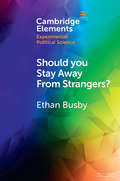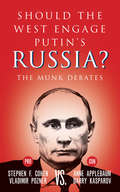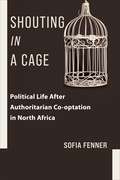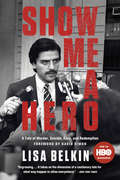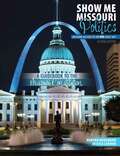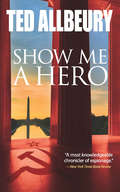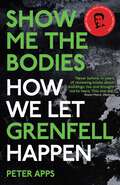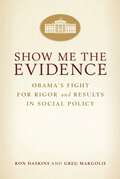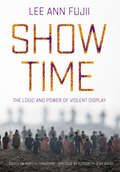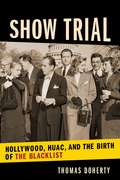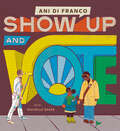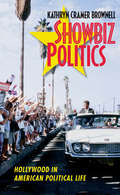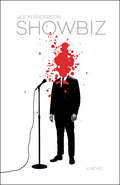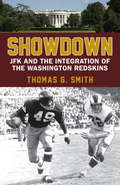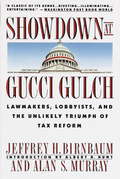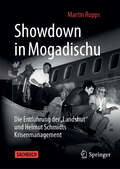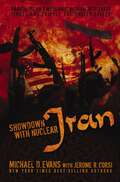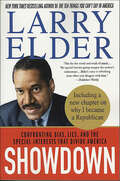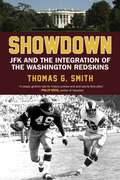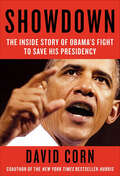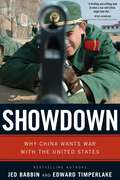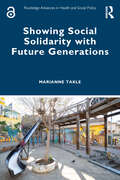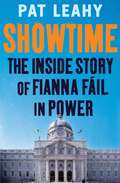- Table View
- List View
Should You Stay Away from Strangers?: Experiments on the Political Consequences of Intergroup Contact (Elements in Experimental Political Science)
by Ethan BusbyHarmonious relationships between groups are critical for democracy, and intergroup contact presents an appealing way to encourage this harmony. However, what kinds of contact work best? Ethan Busby reviews existing studies of contact, propose a framework for studying the political consequences of contact, and discusses four experiments following these recommendations. These studies focus on equal status contact and rely on different samples and contexts. Busby finds that equal-status does not promote more political support for racial and ethnic outgroups and can reduce outgroup support. The Element is concluded by discussing the implications of these findings for the study of contact generally.
Should the West Engage Putin’s Russia?: The Munk Debates (The Munk Debates #2015)
by Garry Kasparov Vladimir Pozner Anne Applebaum Stephen CohenHow should the West deal with Putin’s Russia? For the U.S. and some European powers the answer is obvious: isolate Russia with punishing economic sanctions, remove it from global institutions such as the G8, and arm the nations directly threatened by Putin. In short, return to the Cold War doctrine that froze Soviet aggression in Europe and helped bring about the collapse of communist Russia. Others argue that such a policy is a dead end. Putin’s Russia has legitimate grievances against Western and NATO powers meddling in its sphere of influence. Instead of further antagonizing Putin and risking a dangerous escalation of the current conflict, the U.S. and Europe should seek common cause with Russia to address shared threats, from the Middle East to Asia to combatting terrorism.In the fifteenth semi-annual Munk Debate, acclaimed academic Stephen F. Cohen and veteran journalist and bestselling author Vladimir Poznar square off against internationally renowned expert on Russian history Anne Applebaum and Russian-born political dissident Garry Kasparov to debate the future of the West’s relationship with Russia.
Shouting in a Cage: Political Life After Authoritarian Co-optation in North Africa (Columbia Studies in Middle East Politics)
by Sofia FennerDurable authoritarian rule often rests on the co-optation of challengers. The conventional story is straightforward: rulers entice opposition groups to “sell out,” offering them benefits if they set aside their antiauthoritarian aspirations and become part of the system. However, co-optation does not always neutralize former adversaries, and even seemingly domesticated opponents can turn on their rulers. Co-optation does weaken opposition—but it is not as simple, reliable, or transactional as existing theories claim.Shouting in a Cage offers new ways to understand co-optation’s power and its limits by examining two co-opted parties, the Wafd Party in Egypt and the Istiqlal Party in Morocco. Sofia Fenner argues that co-optation is less a corrupt bargain than a discursive contest—a clash of competing interpretations. Co-opted parties conjure up imagined futures in which their short-term choices will lead to the realization of their long-term democratic goals. Meanwhile, other actors point to the disconnect between these parties’ antiauthoritarian aspirations and their participation in authoritarian systems. Fenner demonstrates that co-opted parties come to look hypocritical precisely because they refuse to give up their oppositional commitments. Their credibility sapped, they become unappealing allies and, eventually, political afterthoughts. However, such parties retain a surprising capacity for opposition, rooted in the literal and metaphorical idea of “party as family.” Based on extensive archival research and ethnographic fieldwork in North Africa, Shouting in a Cage broadens our understanding of political behavior under authoritarianism.
Show Me A Hero
by Lisa BelkinNOW AN HBO MINISERIESNot in my backyard -- that's the refrain commonly invoked by property owners who oppose unwanted development. Such words assume a special ferocity when the development in question is public housing. Lisa Belkin penetrates the prejudices, myths, and heated emotions stirred by the most recent trend in public housing as she re-creates a landmark case in riveting detail, showing how a proposal to build scattered-site public housing in middle-class neighborhoods nearly destroyed an entire city and forever changed the lives of many of its citizens.-- Public housing projects are being torn down throughout the United States. What will take their place? Show Me a Hero explores the answer.-- An important and compelling work of narrative nonfiction in the tradition of J. Anthony Lukas's Common Ground.-- A sweeping yet intimate group portrait that assesses the effects of public policy on individual human lives.
Show Me Missouri Politics: A Guidebook to the Missouri Constitution
by Robynn Kuhlmann Jessica CannonShow Me Missouri Politics: A Guidebook to the Missouri Constitution
Show Me a Hero
by Ted Allbeury"Certain things are constants and Ted Allbeury is one. In book after book the prolific British writer of espionage tales has maintained a superior level." — New York Times Book Review"The most consistently inventive of our novelists of espionage, the one that other thriller writers point to as the finest craftsman among them." — Guardian, U.K. "No one picks through the intelligence maze with more authority or humanity than Allbeury." — Sunday (London) TimesAndrei Aarons cherished the noble ideals of Communism from his earliest childhood. Recognizing his devotion to the Party and his remarkable powers of persuasion, the Soviets dispatch Aarons to Paris in 1930 and eight years later to the United States. In New York City, Aarons poses as a middle-class bookseller, all the while establishing a flourishing espionage network. But Aarons grows disenchanted over the years, between the reports from Moscow of corruption, greed, and murder and his own increasing concern about the possibility of war between the superpowers. Hoping to keep tensions from bubbling over, Aarons turns double agent, maintaining his Soviet contacts but all the while conducting secret meetings with American presidents Truman, Eisenhower, and Kennedy. Based on a real-life story, this suspenseful novel by a former British Intelligence officer offers a captivating tale of Cold War espionage.
Show Me the Bodies: How We Let Grenfell Happen
by Peter AppsOn 14 June 2017, a 24-storey block of flats went up in flames. The fire climbed up cladding as flammable as solid petrol. Fire doors failed to self-close. No alarm rang out to warn sleeping residents. As smoke seeped into their homes, all were told to &‘stay put&’. Many did – and they died. It was a disaster decades in the making. Peter Apps exposes how a steady stream of deregulation, corporate greed and institutional indifference caused this tragedy. It is the story of a grieving community forsaken by our government, a community still waiting for change.
Show Me the Evidence
by Ron Haskins Greg MargolisThis book tells the story of how the Obama administration planned and enacted several initiatives to fund social programs based on rigorous evidence of success and thereby created a fundamental change in the role of evidence in federal policymaking.Using interviews with the major players from the White House, the Office of Management and Budget, federal agencies, Congress, and the child advocacy community, the authors detail the development and implementation of six evidence-based social policy initiatives by the Obama administration.The initiatives range widely over fundamental issues in the nation's social policy including preschool and K-12 education, teen pregnancy, employment and training, health, and community-based programs. These initiatives constitute a revolution in the use of social science evidence to guide federal policymaking and the operation of federal grant programs.A fascinating story for everyone interested in politics and policy, this book also provides a blueprint for policymakers worldwide who are interested in expanding the use of evidence in policy.
Show Me the Evidence
by Ron Haskins Greg MargolisThe first comprehensive history of the Obama administration's evidence-based initiatives. From its earliest days, the Obama administration planned and enacted several initiatives to fund social programs based on rigorous evidence of success. Ron Haskins and Greg Margolis tell the story of six-spanning preschool and K-12 education, teen pregnancy, employment and training, health, and community-based programs.Readers will appreciate the fast-moving descriptions of the politics and policy debates that shaped these federal programs and the analysis of whether they will truly reshape federal social policy and greatly improve its impacts on the nation's social problems.Based on interviews with 134 individuals (including advocates, officials at the Office of Management and Budget and the Domestic Policy Council, Congressional staff, and officials in the federal agencies administering the initiatives) as well as Congressional and administration documents and news accounts, the authors examine each of the six initiatives in separate chapters. The story of each initiative includes a review of the social problem the initiative addresses; the genesis and enactment of the legislation that authorized the initiative; and the development of the procedures used by the administration to set the evidence standard and evaluation requirements-including the requirements for grant applications and awarding of grants.
Show Time: The Logic and Power of Violent Display
by Lee Ann FujiiIn Show Time, Lee Ann Fujii asks why some perpetrators of political violence, from lynch mobs to genocidal killers, display their acts of violence so publicly and extravagantly. Closely examining three horrific and extreme episodes—the murder of a prominent Tutsi family amidst the genocide in Rwanda, the execution of Muslim men in a Serb-controlled village in Bosnia during the Balkan Wars, and the lynching of a twenty-two-year old Black farmhand on Maryland's Eastern Shore in 1933—Fujii shows how "violent displays" are staged to not merely to kill those perceived to be enemies or threats, but also to affect and influence observers, neighbors, and the larger society. Watching and participating in these violent displays profoundly transforms those involved, reinforcing political identities, social hierarchies, and power structures. Such public spectacles of violence also force members of the community to choose sides—openly show support for the goals of the violence, or risk becoming victims, themselves. Tracing the ways in which public displays of violence unfold, Show Time reveals how the perpetrators exploit the fluidity of social ties for their own ends.
Show Trial: Hollywood, HUAC, and the Birth of the Blacklist (Film and Culture Series)
by Thomas DohertyIn 1947, the Cold War came to Hollywood. Over nine tumultuous days in October, the House Un-American Activities Committee held a notorious round of hearings into alleged Communist subversion in the movie industry. The blowback was profound: the major studios pledged to never again employ a known Communist or unrepentant fellow traveler. The declaration marked the onset of the blacklist era, a time when political allegiances, real or suspected, determined employment opportunities in the entertainment industry. Hundreds of artists were shown the door—or had it shut in their faces.In Show Trial, Thomas Doherty takes us behind the scenes at the first full-on media-political spectacle of the postwar era. He details the theatrical elements of a proceeding that bridged the realms of entertainment and politics, a courtroom drama starring glamorous actors, colorful moguls, on-the-make congressmen, high-priced lawyers, single-minded investigators, and recalcitrant screenwriters, all recorded by newsreel cameras and broadcast over radio. Doherty tells the story of the Hollywood Ten and the other witnesses, friendly and unfriendly, who testified, and chronicles the implementation of the postwar blacklist. Show Trial is a rich, character-driven inquiry into how the HUAC hearings ignited the anti-Communist crackdown in Hollywood, providing a gripping cultural history of one of the most transformative events of the postwar era.
Show Up and Vote
by Ani DiFrancoFrom the Grammy award-winning singer-songwriter, political activist, and feminist icon comes a story of connectedness and collective responsibility, as told through the eyes of a young child going to vote for the first time.Singer-songwriter, activist, feminist, and best-selling author Ani Di Franco has penned a lyrical narrative for her youngest audience: a picture book about the eye-opening act of voting. A young girl accompanies her mother to their local polling station and pays witness to the commonality of this experience. Her mother gently reinforces the great responsibility and importance of this act, while the girl moves through feelings of excitement, nervousness, and ultimately, invigoration. Rachelle Baker adds an authentic neighborhood feel in a range of bright, bold colors and familiar faces, establishing a realistic and relatable setting. An age-appropriate call-to-action for all young citizens.
Showbiz Politics: Hollywood in American Political Life
by Kathryn Cramer BrownellConventional wisdom holds that John F. Kennedy was the first celebrity president, in no small part because of his innate television savvy. But, as Kathryn Brownell shows, Kennedy capitalized on a tradition and style rooted in California politics and the Hollywood studio system. Since the 1920s, politicians and professional showmen have developed relationships and built organizations, institutionalizing Hollywood styles, structures, and personalities in the American political process. Brownell explores how similarities developed between the operation of a studio, planning a successful electoral campaign, and ultimately running an administration. Using their business and public relations know-how, figures such as Louis B. Mayer, Bette Davis, Jack Warner, Harry Belafonte, Ronald Reagan, and members of the Rat Pack made Hollywood connections an asset in a political world being quickly transformed by the media. Brownell takes readers behind the camera to explore the negotiations and relationships that developed between key Hollywood insiders and presidential candidates from Dwight Eisenhower to Bill Clinton, analyzing how entertainment replaced party spectacle as a strategy to raise money, win votes, and secure success for all those involved. She demonstrates how Hollywood contributed to the rise of mass-mediated politics, making the twentieth century not just the age of the political consultant, but also the age of showbiz politics.
Showbiz: A Novel
by Jason AndersonA comedian&’s career is ended after a presidential assassination, and a journalist tries to track him down decades later, in this darkly humorous novel. In 1963, Jimmy Wynn was the second most famous man in America. The comedian&’s uncanny impression of the president made him a star. But when the genuine article died in a hail of bullets on a sunny afternoon in New Orleans, Jimmy&’s career met a fate almost as grisly. What happened to the funny man afterward was a mystery no one cared to solve. Nearly twenty-five years later, Nathan Grant, an ambitious young journalist, discovers the trail Jimmy cut through the entertainment netherworld. He soon comes to realize that this forgotten court jester may have played a very serious part in the country&’s favorite conspiracy theory. His strange and increasingly dangerous odyssey takes him from a dingy New York record store to the showrooms of Las Vegas, a ghost town in the Mojave Desert, and even a dinner theatre in Niagara Falls, in a dark comedy about the cost of fame, the story of a man who became a punchline and a writer who is desperate to find out how the rest of the joke goes. &“A weird and hilarious trek through American faux-history.&” —Richard Scrimger, author of Mystical Rose &“An amazing feat of invention and imagining. In the alternate reality of Showbiz, things are funny, touching, and very true.&” —Paul Quarrington, author of King Leary
Showdown
by Thomas G. SmithIn 1961--as America crackled with racial tension--the Washington Redskins stood alone as the only professional football team without a black player on its roster. In fact, during the entire twenty-five-year history of the franchise, no African American had ever played for George Preston Marshall, the Redskins' cantankerous principal owner. With slicked-down white hair and angular facial features, the nattily attired, sixty-four-year-old NFL team owner already had a well-deserved reputation for flamboyance, showmanship, and erratic behavior. And like other Southern-born segregationists, Marshall stood firm against race-mixing. "We'll start signing Negroes," he once boasted, "when the Harlem Globetrotters start signing whites." But that was about to change. Opposing Marshall was Interior Secretary Stewart Udall, whose determination that the Redskins--or "Paleskins," as he called them--reflect John F. Kennedy's New Frontier ideals led to one of the most high-profile contests to spill beyond the sports pages. Realizing that racial justice and gridiron success had the potential either to dovetail or take an ugly turn, civil rights advocates and sports fans alike anxiously turned their eyes toward the nation's capital. There was always the possibility that Marshall--one of the NFL's most influential and dominating founding fathers--might defy demands from the Kennedy administration to desegregate his lily-white team. When further pressured to desegregate by the press, Marshall remained defiant, declaring that no one, including the White House, could tell him how to run his business. In Showdown, sports historian Thomas G. Smith captures this striking moment, one that held sweeping implications not only for one team's racist policy but also for a sharply segregated city and for the nation as a whole. Part sports history, part civil rights story, this compelling and untold narrative serves as a powerful lens onto racism in sport, illustrating how, in microcosm, the fight to desegregate the Redskins was part of a wider struggle against racial injustice in America.From the Hardcover edition.
Showdown at Gucci Gulch
by Alan Murray Jeffrey BirnbaumThe Tax Reform Act of 1986 was the single most sweeping change in the history of America's income tax. It was also the best political and economic story of its time. Here, in the anecdotal style of The Making of the President, two Wall Street Journal reporters provide the first complete picture of how this tax revolution went from an improbable dream to a widely hailed reality.From the Trade Paperback edition.
Showdown in Mogadischu: Die Entführung der „Landshut“ und Helmut Schmidts Krisenmanagement
by Martin RuppsDas Terror-Jahr 1977 mit der Entführung von Arbeitgeberpräsident Hanns Martin Schleyer und später der Lufthansa-Maschine „Landshut“ mit 86 Passagieren und fünf Besatzungsmitgliedern an Bord stellte die Bundesrepublik Deutschland vor ihre bisher größte Belastungsprobe. Bundeskanzler Helmut Schmidt musste ein Krisenmanagement leisten wie noch kein Amtsinhaber vor ihm. Hanns Martin Schleyer wurde von seinen Entführern ermordet, die „Landshut“-Geiseln kamen durch Angehörige der GSG9 frei. Der Politikwissenschaftler und Historiker Martin Rupps, auf den die Rückholung des „Landshut“-Wracks aus Brasilien nach Deutschland zurückgeht, erzählt anhand vieler bisher unveröffentlichter Quellen die Geschichte dieser Wochen neu. Erstmals kann er tiefe Einblicke geben in das Denken und Handeln von Bundeskanzler Helmut Schmidt und den Mitgliedern des Kleinen und Großen Krisenstabs. Helmut Schmidt war in diesen Wochen entgegen der offiziellen Darstellung der einsamste Politiker der Welt. In der entführten „Landshut“ selbst trugen sich die Ereignisse anders zu als bisher erzählt. „Der Mensch ist des Menschen Wolf“, hat der Philosoph Thomas Hobbes geschrieben.
Showdown with Nuclear Iran: Radical Islam's Messianic Mission to Destroy Israel and Cripple the United States
by Jerome R. Corsi Michael EvansIs the world ready for nuclear Jihad? Showdown with Nuclear Iran is a gripping and detailed exposé of Iran's relentless pursuit of atomic weapons and its apocalyptic goal of wiping Israel off the face of the earth. Michael D. Evans, who has been working in the Middle East for the last three decades, cuts through the official lies and deceptions of the Iranian government and reveals in terrifying detail:how close the radical Islamic republic is to fulfilling its nuclear ambitions -- how Iran's president believes he has a divine mission to destroy Israel and cripple the United States in a nuclear holocaust and what America must do to avert this global disaster. With the Middle East poised at the brink, Showdown with Nuclear Iran provides much-needed perspective on the current crisis and the dire threat that a nuclear Iran poses to the existence of Israel and global stability."The most detailed account of the Iranian regime's determination, policy, and plan to acquire military nuclear capabilities. Mike Evans delves into the roots of the Iranian revolution and explores Iranian history to better understand a major challenge to the western world. he compellingly analyzes policy options for confronting this threat." ? Lt. Gen. Moshe Ya'Alon, red., former Chief of Staff, Israeli Defense Force
Showdown: Confronting Bias, Lies, and the Special Interests That Divide America
by Larry ElderThe Ten Things You Can't Say in America struck a chord with eager readers across the country, exposing truths others have been too afraid to address. In his new book, Elder is out to slay entrenched and enmeshed special interest groups, government agencies with the capacity to meddle in Americans' lives and businesses, lawmakers who continue a pattern of outrageous overtaxation, and those who would hamstring this country with good intentions.Showdown demonstrates how the nation would be better, stronger and safer with less gvernment intervention and how individuals would not only cope but thrive without the so-called safety net. Showdown is a call to arms for a truly free society. Elder discusses:- What a Republican-led government means for progress- Where a responsible government would put its citizens' tax dollars- Why racial and sex discrimination are non-issues in the 21st century.Larry Elders straight talk and common-sense solutions spare no one and will inspire his passionate and growing audience.
Showdown: JFK and the Integraton of the Washington Redskins
by Thomas G. SmithIn 1961—as America crackled with racial tension—the Washington Redskins stood alone as the only professional football team without a black player on its roster. In fact, during the entire twenty-five-year history of the franchise, no African American had ever played for George Preston Marshall, the Redskins’ cantankerous principal owner. With slicked-down white hair and angular facial features, the nattily attired, sixty-four-year-old NFL team owner already had a well-deserved reputation for flamboyance, showmanship, and erratic behavior. And like other Southern-born segregationists, Marshall stood firm against race-mixing. “We’ll start signing Negroes,” he once boasted, “when the Harlem Globetrotters start signing whites.” But that was about to change. Opposing Marshall was Interior Secretary Stewart Udall, whose determination that the Redskins—or “Paleskins,” as he called them—reflect John F. Kennedy’s New Frontier ideals led to one of the most high-profile contests to spill beyond the sports pages. Realizing that racial justice and gridiron success had the potential either to dovetail or take an ugly turn, civil rights advocates and sports fans alike anxiously turned their eyes toward the nation’s capital. There was always the possibility that Marshall—one of the NFL’s most influential and dominating founding fathers—might defy demands from the Kennedy administration to desegregate his lily-white team. When further pressured to desegregate by the press, Marshall remained defiant, declaring that no one, including the White House, could tell him how to run his business.
Showdown: The Inside Story of How Obama Fight to Save His Presidency
by David CornThe veteran political journalist and New York Times bestselling author goes behind the scenes at the White House to recount the dramatic tale of a pivotal period in the Obama presidency, from the game-changing 2010 midterm elections to the beginning of the critical 2012 campaign season—a tumultuous time that tested the president as never before and set the stage for a titanic clash over the future of the nationAfter Barack Obama's first two years as president—during which he navigated the United States through its severest economic crisis since the Great Depression while managing wars in Afghanistan and Iraq—he was faced with a bitterly divided nation and an emboldened political opposition dedicated to impeding his presidency. What followed was a year of political crises and fierce battles that would transform Obama and profoundly shape the terrain for the next election.In Showdown, astute political journalist David Corn chronicles and examines this crucial time in the Obama presidency and its impact on the nation's future. Drawing on interviews with White House officials, Obama's inner circle, members of Congress, and others, Corn takes the reader into the Oval Office and the back rooms on Capitol Hill for a fast-paced and gripping account of the major events as they unfolded: the controversial tax-cut deal with Congress in December 2010; the repeal of Don't Ask/Don't Tell; the passage of the New START treaty; the near shutdown of the government in early 2011; the revolutionary Arab spring; the killing of Osama bin Laden; the intense, high-wire debt-ceiling negotiations (in which intransigent House Republicans risked the nation's financial standing); House Speaker John Boehner's erratic maneuvers during the rise and fall of the grand bargain; and the face-off between Obama and congressional Republicans over how best to create jobs. Corn captures the dilemmas faced by a president assailed by disappointed progressives and defiantly obstructionist Republicans determined to see his defeat. Here is a chief executive trying to balance the cross-cutting demands of governance and politics while handling unending challenges at home and abroad. The book reveals a thoughtful leader with a cool head who is unafraid to take risks and make tough choices, a steely battler who successfully turned his enemies' obstinacy to his advantage. Obama has often frustrated supporters, but Corn shows how the president, who often puts pragmatism ahead of partisan demands, has craftily operated within a hostile conservative political climate, looking to win the long game, achieve progressive goals, and, ultimately, win reelection.A vivid and powerful account of White House decision-making, Showdown offers a unique and enlightening look at the turbulent American political scene during one of the most consequential moments of the nation's history, and explains the fascinating and complicated leader at the heart of this vortex.
Showdown: Why China Wants War With the United States
by Edward Timperlake Jed L. BabbinShowdown: Why China Wants War With the United Statesby Jed L. Babbin and Edward Timperlake
Showing Social Solidarity with Future Generations (Routledge Advances in Health and Social Policy)
by Marianne TakleToday’s generations can affect the future ecosystem more than any previous generations and aggravate the welfare of future people. People who have not yet been born are excluded from political decisions important to their lives. Due to the future generations’ lack of influence, current generations have a responsibility to act.The current generation's responsibility for the well-being of future generations has been used as an argument for an increasing number of legislative and policy measures across the world but are rarely followed up in practice.This book examines when commitments to future generations are followed up in practice and in what situations they are not.A concept of solidarity with future generations is developed and applied to four policy areas: the UN 2030 Agenda, national political institutions for future generations, constitutions and climate lawsuits, and regulations of economic debt or savings for future generations. Germany and Norway are selected as cases to evaluate what the commitments might entail in practice.The book highlights where the gaps emerge, and what needs to be done. The failing transition from the global to the national level highlights a need for stronger cosmopolitan elements in the international political system. Institutional bindings are generally weak at the national level. Financial restrictions show it is possible to establish strong institutional constraints, but the focus on financial resources is too narrow. Both national and global institutional bindings must be strengthened to show social solidarity with future generations.
Showroom City: Real Estate and Resistance in the Furniture Capital of the World (Globalization and Community)
by John Joe SchlichtmanA unique and engaging account of local urban decision-making within the globalizing world High Point, North Carolina, is known as the &“Furniture Capital of the World.&” Once a manufacturing stronghold, most of its furniture factories have closed over the past forty years, with production shipped off to low-wage countries. Yet as manufacturing left, the city tightened its hold on a biannual global exposition that serves as the world&’s furniture fashion runway. At the High Point Market, visitors from more than one hundred nations traverse twelve million square feet of meticulous design. Downtown buildings—once courthouses, movie theaters, post offices, and gas stations—are now chic showroom spaces, even as many sit empty between each exposition.In Showroom City, John Joe Schlichtman applies an ethnographic lens to the global exposition&’s relationship with High Point after it defeated rival Chicago in the 1960s and established itself as the world&’s dominant furniture center. In recent decades, following trends in global finance, private equity firms were increasingly behind downtown High Point&’s real estate transactions, coordinated by buyers far removed from the region. Then, in one massive transaction in 2011, a firm funded by Bain Capital purchased every major showroom building, and the majority of downtown real estate was under one owner. Showroom City is a story of exclusionary growth and unchecked development, of a city flailing to fill the void left by its dwindling factories. But beyond that Schlichtman engages the general lessons behind both High Point&’s deindustrialization and its stunning reinvention as a furniture fashion, merchandising, and design node. With great nuance, he delves deeply to reveal how power operates locally and how citizens may affirm, exploit, influence, and resist the takeover of their community.
Showtime: The Inside Story of Fianna Fáil in Power
by Pat LeahyIn boom and in bust, Ireland has been led by Fianna Fáil. Showtime gets behind the party's remarkable dominance of the political landscape and leading political writer Pat Leahy, tells the gripping story of how it won, kept and has used power since the mid-1990s.Showtime explains how Fianna Fáil operated during the boom years - from November 1994, when Bertie Ahern assumed leadership of a battered party, expecting to become Taoiseach but instead finding himself cast into opposition, to the day he relinquished the party leadership on the brink of the bust. For a decade after it achieved power in 1997, Fianna Fáil led the government during an unprecedented economic boom and enjoyed riches beyond the wildest dreams of any previous administration. Showtime reveals how government really worked in these years: the favours, the grudges, the backroom deals, the political strokes, the policy compromises and the choices that have led the country to where it is today.Showtime is politics in the raw: the exciting, enlightening and sometimes disturbing story of a remarkable era that changed the face of modern Ireland.
